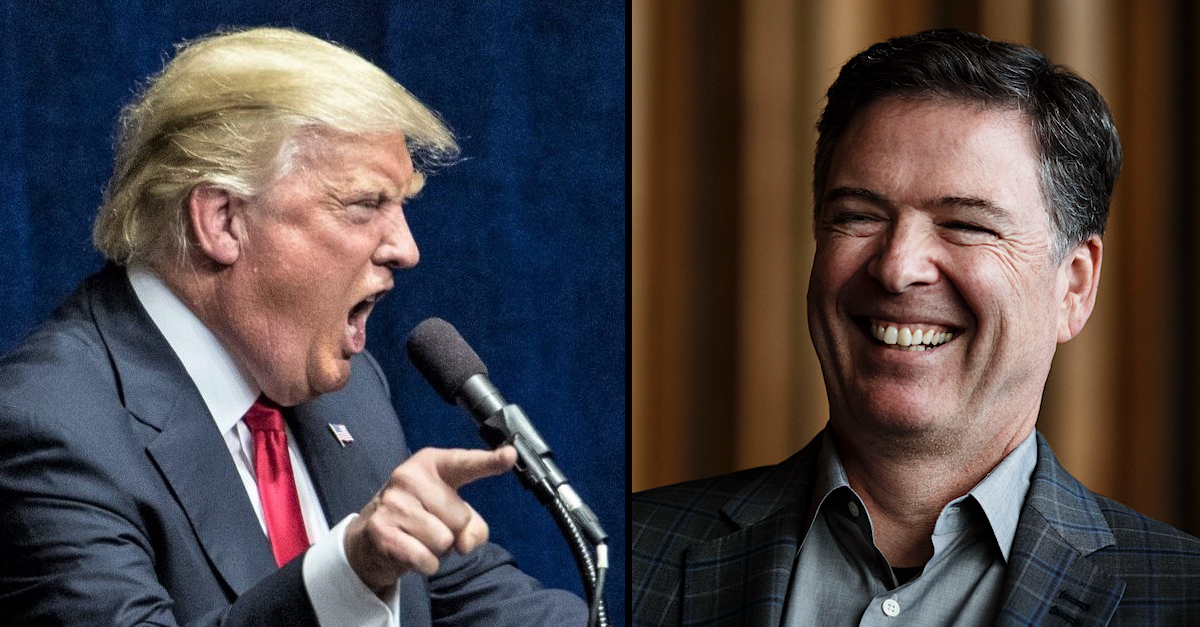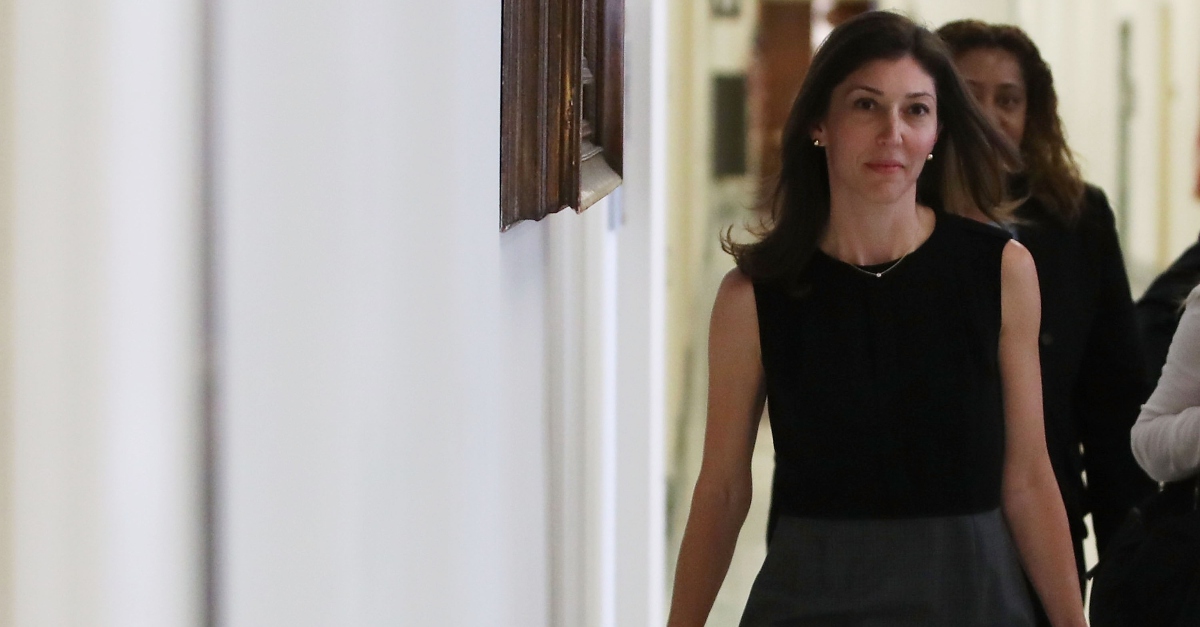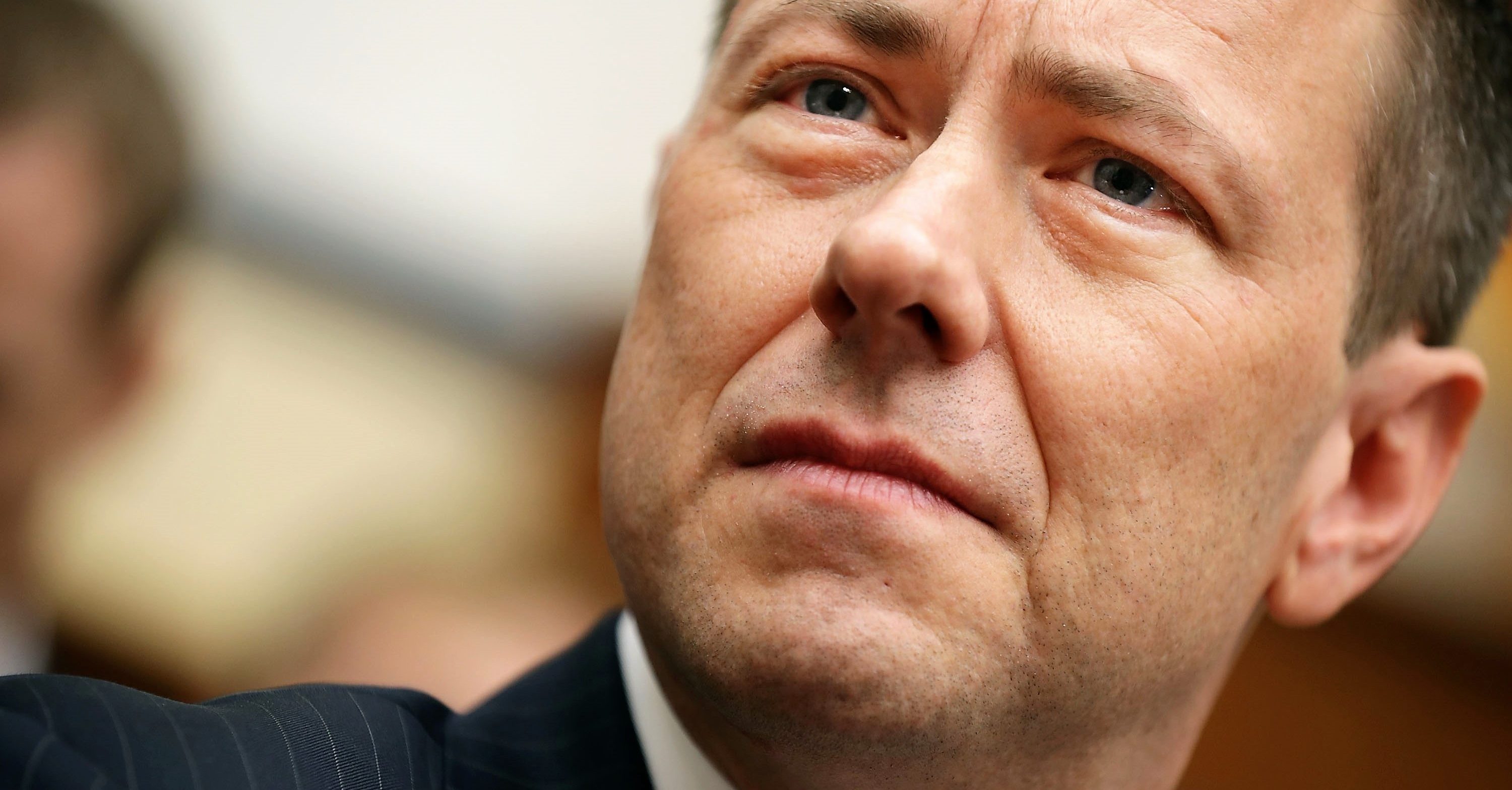
Donald Trump was captured in a bombastic pose on April 6, 2016, in Bethpage, N.Y. James Comey was photographed backstage during a talk in Berlin, Germany, on June 19, 2019.
A federal judge has removed fired FBI director James Comey, fired FBI Deputy Director Andrew McCabe, fired FBI agent Peter Strzok, resigned FBI lawyer Lisa Page, and former FBI lawyer Kevin Clinesmith as personal defendants in Donald Trump’s RICO lawsuit against Hillary Clinton and other individuals and institutions.
Trump filed the $24 million lawsuit against the aforementioned defendants and others, including the Democratic National Committee, on March 24. He amended the lawsuit by nearly doubling its page count on June 22. In a pile of separate but logically connected motions to dismiss, Clinton and most of the other defendants have argued that Trump’s claims are barred by the statute of limitations or otherwise fail as a matter of law.
Trump is arguing that the defendants “maliciously conspired to weave a false narrative that their Republican opponent, Donald J. Trump, was colluding with a hostile foreign sovereignty.” He has alleged violations of the Racketeer Influenced and Corrupt Organizations (RICO) Act, conspiracy, injurious falsehood, malicious prosecution, computer fraud, theft of trade secrets, violations of the Stored Communications Act, and several other causes of action.

Former FBI Lawyer Lisa Page, walks to a House Judiciary Committee closed door meeting in the Rayburn House Office Building, on July 13, 2018 in Washington, DC. Page Page worked on the special counsel’s Russia investigation, and her text messages with Peter Strzok is under scrutiny by House Republicans. (Photo by Mark Wilson/Getty Images.)
The federal government was not a defendant to the lawsuit. However, it moved U.S. District Judge Donald M. Middlebrooks on July 14 to “substitute itself as a defendant” instead of Comey, McCabe, Strzok, Page, and Clinesmith. The cited authority for the move was 28 U.S.C. § 2679(d)(1), a federal statute which reads accordingly:
Upon certification by the Attorney General that the defendant employee was acting within the scope of his office or employment at the time of the incident out of which the claim arose, any civil action or proceeding commenced upon such claim in a United States district court shall be deemed an action against the United States under the provisions of this title and all references thereto, and the United States shall be substituted as the party defendant.
In other words, the claim must proceed against the government, not against the individual, when the individual was conducting affairs that were part of his or her scope of employment. The procedure is legally known as a Westfall Act Substitution.”
“Because plaintiff’s tort claims are based upon conduct within the scope of these former FBI employees’ employment with the government, the United States is the sole and exclusive defendant for those claims,” government lawyers wrote to Judge Middlebrooks on July 14.

Peter Strzok. (Image via Chip Somodevilla/Getty Images.)
The government pointed squarely to Trump’s own complaint to articulate several precise reasons why the Westfall Act Substitution was appropriate in this case:
In this action, plaintiff, former President Trump, seeks damages because defendants allegedly “falsif[ied] evidence, deceiv[ed] law enforcement, spread[] disinformation through the media, and exploit[ed] access to highly-sensitive data sources” to the detriment of his reputation. Am. Compl. ¶ 1. He further alleges that these acts led to “legal issues and political issues,” and that he incurred “substantial economic harm” responding to those issues. Id. ¶ 525. He seeks damages for his costs associated with responding to numerous investigations and his impeachment.
Amongst many other defendants, plaintiff sues James Comey as “7th Director of the Federal Bureau of Investigation,” Peter Strzok as “an agent of the Federal Bureau of Investigation,” Lisa Page as “an attorney for the Federal Bureau of Investigation,” Kevin Clinesmith as “an attorney for the Federal Bureau of Investigation,” and Andrew McCabe as “the Deputy Director of the Federal Bureau of Investigation.” Id. 38–42. As FBI employees, plaintiff alleges that the foregoing defendants “opened a full field investigation,” “falsely accuse[d General] Flynn of colluding with Russia,” kept open its investigation after General Flynn withdrew from consideration for the position of National Security Advisor, leaked information about the investigation to the press, expanded its investigation to include other individuals aside from General Flynn, and engaged in the Foreign Intelligence Surveillance Act (“FISA”) application processes during the investigation. Id. ¶¶ 342–448. This conduct, plaintiff alleges, amounted to malicious prosecution and, in collaboration with other defendants’ alleged acts, conspiracy to commit malicious prosecution. Id. ¶¶ 667–692.
The government therefore concluded as follows:
Here, Comey, McCabe, Strzok, Page, and Clinesmith all easily satisfy the District of Columbia’s scope of employment test. Counterintelligence operations and FISA surveillance are activities of the FBI. And the incidents out of which plaintiff’s claims arose here relate to such activities. The employees easily pass the first prong of the District of Columbia’s scope of employment test, which does not pose a high bar.
Second, plaintiff identifies the former FBI employees as high-level officials and staff members working on high-level matters. [Citations omitted.] As high-level FBI officials and staff members, they understandably had no set “business hours” and performed official conduct at varying hours and locations. The Amended Complaint contains no allegations that their acts or omissions occurred in any context other than during the FBI counterintelligence investigation or that they occurred outside the authorized time and space limits of their jobs. Thus, these employees acted “within the authorized time and space limits.”
Third, all alleged conduct was “actuated, at least in part, by a purpose to serve the” United States. [Citation omitted.] These FBI employees were acting in furtherance of an approved and authorized counterintelligence operation. That operation necessarily entailed FISA applications.
Thus, Comey, McCabe, Strzok, Page, and Clinesmith were all employees of the government and, at all material times, all of their acts or omissions alleged in the Amended Complaint occurred within the scope of their employment under District of Columbia respondeat superior law. The Court should reject any challenge to the certification of Comey, McCabe, Strzok, Page, and Clinesmith.
The government then argued that the case should be dismissed because the court lacked subject matter jurisdiction over Trump’s complaint. Specifically, the government noted that Trump’s attorneys filed to present his malicious prosecution claims to the FBI before filing Trump’s voluminous lawsuit in federal court. Tort claims against the government must be subjected to “administrative presentment requirements” under the Federal Tort Claims Act; here, Trump made no such submission, and several of his claims instantly must fail, the government argued.

Andrew McCabe. (Image via the FBI.)
Late on Thursday, Judge Middlebrooks agreed to substitute the government as a defendant instead of Comey, McCabe, Strzok, Page, and Clinesmith. However, Middlebrooks chose not to immediately rule on the broader request to jettison the litigation against the government as a substituted party.
In his three-page order, Middlebrooks characterized Trump’s lawsuit as “sprawling” and recited, without much additional commentary, the rote mechanisms of Westfall Act Substitution: individuals were sued; they were acting within the scope of their employment as ascertained by the Attorney General; and the court “was required” to accept the Attorney General’s certification.
Middlebrooks noted that he could technically determine that the named federal officers were “acting outside the scope of [their] employment” and that Trump could “litigate the question” if he so chooses. If Trump does contest the matter, Trump “has the burden of altering the status quo by proving that the employee acted outside the scope of employment.” That will be difficult to overcome, Middlebrooks suggested, because the AG’s “certification constitutes prima facie evidence that the employees were acting within the scope of their employment.”
Comey, McCabe, Strzok, Page, and Clinesmith all now appear as terminated parties in the court docket.
The original government motion and the judge’s order are below:
[Photo of Trump by Andrew Renneisen/Getty Images; photo of Comey via Carsten Koall/Getty Images.]